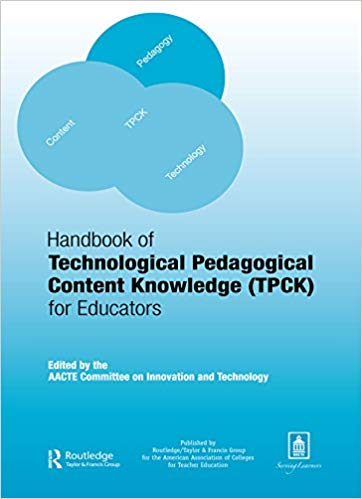
Herring, M. C., Koehler, M. J. & Mishra, P. (2011). Handbook of Technological Pedagogical Content Knowledge for Educators. New York, NY: Routledge.
Abstract
This Handbook addresses the concept and implementation of technological pedagogical content knowledge—the knowledge and skills that teachers need in order to meaningfully integrate technology into instruction in specific content areas. Recognizing, for example, that effective uses of technology in mathematics are quite different from effective uses of technology in social studies, teachers need specific preparation in using technology in each content area they will be teaching. Offering a series of chapters by scholars in different content areas who apply the technological pedagogical content knowledge framework to their individual content areas, the volume is structured
around three themes:
• What is technological pedagogical content knowledge?
• Integrating technological pedagogical content knowledge into specific
subject areas
• Integrating technological pedagogical content knowledge into
teacher education and professional development
The Handbook of Technological Pedagogical Content Knowledge (TPCK) for Educators is simultaneously a mandate and a manifesto on the engagement of technology in classrooms based on consensus standards and rubrics for effectiveness. As the title of the concluding chapter declares, “It’s about time!”
Annotation
It is widely acknowledged that teachers play an important role in determining the time, place and way in which technology is engaged with in the classroom. The research papers that make up this book all argue that to maximize classroom instruction, teaching and technology should be in harmony. Each chapter therefore investigates the complicated relationship that exists between pedagogy, technology and good instruction. For anyone wanting to learn more about TPCK, this book is a great collection of the most important articles that have contributed to this framework.
Leave a Reply